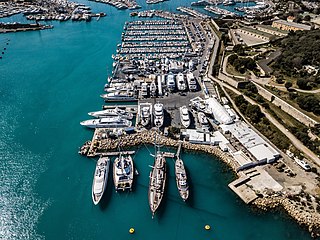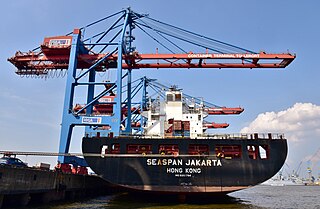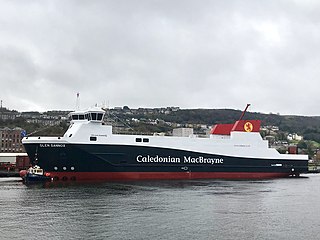
The Firth of Clyde is the mouth of the River Clyde. It is located on the west coast of Scotland and constitutes the deepest coastal waters in the British Isles. The firth is sheltered from the Atlantic Ocean by the Kintyre peninsula, which encloses the outer firth in Argyll and Ayrshire. The Kilbrannan Sound is a large arm of the Firth of Clyde, separating the Kintyre Peninsula from the Isle of Arran. Within the Firth of Clyde is another major island – the Isle of Bute. Given its strategic location at the entrance to the middle and upper Clyde, Bute played a vital naval military role during World War II.

Harland & Wolff is a British shipbuilding and fabrication company headquartered in London with sites in Belfast, Arnish, Appledore and Methil. It specialises in ship repair, shipbuilding and offshore construction. Harland & Wolff is famous for having built the majority of the ocean liners for the White Star Line, including Olympic-class trio – RMS Olympic, RMS Titanic and HMHS Britannic. Outside of White Star Line, other ships that have been built include the Royal Navy's HMS Belfast; Royal Mail Line's Andes; Shaw, Savill & Albion's Southern Cross; Union-Castle's RMS Pendennis Castle; P&O's Canberra; and Hamburg-America's SS Amerika of 1905. Harland and Wolff's official history, Shipbuilders to the World, was published in 1986.

A shipyard, also called a dockyard or boatyard, is a place where ships are built and repaired. These can be yachts, military vessels, cruise liners or other cargo or passenger ships. Compared to shipyards, which are sometimes more involved with original construction, dockyards are sometimes more linked with maintenance and basing activities. The terms are routinely used interchangeably, in part because the evolution of dockyards and shipyards has often caused them to change or merge roles.

Greenock is a town and administrative centre in the Inverclyde council area in Scotland, United Kingdom and a former burgh within the historic county of Renfrewshire, located in the west central Lowlands of Scotland. It forms part of a contiguous urban area with Gourock to the west and Port Glasgow to the east.

Caledonian MacBrayne, usually shortened to CalMac, is the major operator of passenger and vehicle ferries, and ferry services, between the mainland of Scotland and 22 of the major islands on Scotland's west coast. Since 2006, the company's official name has been CalMac Ferries Ltd, although it still operates as Caledonian MacBrayne. In 2006, it became a subsidiary of holding company David MacBrayne, which is owned by the Scottish Government.

Vigor Shipyards is the current entity operating the former Todd Shipyards after its acquisition in 2011. Todd Shipyards was founded in 1916, which owned and operated shipyards on the West Coast of the United States, East Coast of the United States and the Gulf. Todd Shipyards were a major part of the Emergency Shipbuilding Program for World War II.

MV The Second Snark is a small passenger ferry, built in 1938 by William Denny of Dumbarton, later operated by Clyde Marine Services on the Firth of Clyde, Scotland.

Careening is a method of gaining access to the hull of a sailing vessel without the use of a dry dock. It is used for cleaning or repairing the hull. Before ship's hulls were protected from marine growth by fastening copper sheets over the surface of the hull, fouling by this growth would seriously affect the sailing qualities of a ship, causing a large amount of drag.

Seaspan ULC provides marine-related services to the Pacific Northwest. Within the Group are three shipyards, an intermodal ferry and car float business, along with a tug and barge transportation company that serves both domestic and international markets. Seaspan, is part of the Washington Companies that are owned by Dennis Washington. Kyle Washington, is the Executive Chairman of Seaspan, who has become a Canadian citizen.

MV Matanuska, colloquially known as the Mat, is a mainline Malaspina-class ferry vessel operated by the Alaska Marine Highway System.

MV Clansman is a ferry operated by Caledonian MacBrayne, operating from Oban on the west coast of Scotland.

MV Hebrides is a ferry operated by Caledonian MacBrayne from Uig to Lochmaddy and Tarbert, the main settlements of North Uist and Harris respectively.

MV Hebridean Isles is a ro-ro vehicle ferry operated by Caledonian MacBrayne on the west coast of Scotland. She was the first MacBrayne vessel to be ordered and built for them outside Scotland and the first to be launched sideways. With bow, stern and side ramps, Hebridean Isles is suitable for all the routes served by the large fleet units. After 15 years crossing the Little Minch on the Uig triangle, she now serves Islay and Colonsay.

MV Isle of Arran is a drive-through ferry operated on the west coast of Scotland by Caledonian MacBrayne. Entering service in 1984, she served on the Arran route for nine years before being moved to Kennacraig. She returned to her original route in 2012, supplementing MV Caledonian Isles in summer and becoming a relief vessel in winter. In 2013, she started a new pilot route from Ardrossan to Campbeltown, which became a permanent fixture in 2015. As of 2023, she is one of the oldest vessels in the fleet, having been in service for 39 years.

Aberdeen Harbour, rebranded as the Port of Aberdeen in 2022, is a sea port located in the city of Aberdeen on the east coast of Scotland. The port was first established in 1136 and has been continually redeveloped over the centuries to provide a base for significant fishing and ship building industries. Since the 1970s it has provided support to the offshore oil and gas industry operating in the North Sea and it is the main commercial port in the north east of Scotland.
Alexander Hall and Sons was a shipbuilder that operated in Aberdeen from 1797 to 1957. They designed the pointed and sharply raked Aberdeen bow" first used on the Scottish Maid and which became a characteristic of the "extreme clippers".
Reliance Naval and Engineering Limited (R-Naval), formerly known as Reliance Defence & Engineering Limited and prior to that as Pipavav Shipyard Limited and Pipavav Defence & Offshore Engineering Company Limited is an Indian shipbuilding and heavy industry company headquartered in Mumbai. The shipyard is located in Pipavav, Gujarat, at a distance of 90 km South of Amreli, 15 km South of Rajula and 140 km South West of Bhavnagar. R-Naval is the first private sector company in India to obtain a license and contract to build warships. Pipavav is the largest shipyard in India.
BAE Systems Southeast Shipyards is a division of BAE Systems Ship Repair, which itself is a subsidiary of BAE Systems Inc., the North American arm of British defense conglomerate BAE Systems. It was formed through the acquisition of Atlantic Marine from the J.F. Lehman and Company private equity firm in May 2010 for $352 million.

MV Glen Sannox is a dual-fuel car and passenger ferry currently under construction at Ferguson Marine in Port Glasgow for Caledonian MacBrayne, planned to serve the Ardrossan to Brodick crossing. Initially expected to enter service in summer 2018 at a cost of £97 million, as of December 2023 the ship remains under construction and has been the subject of an ongoing political scandal known as the "ferry fiasco" owing to increased costs and lengthy delays.

Volharding Dock, was a floating dry dock built for the Nederlands Indische Droogdok Maatschappij (NIDM) in the 1870s. It was the smallest of two unique tower dry docks, and the only one that would actually be put in use.

















